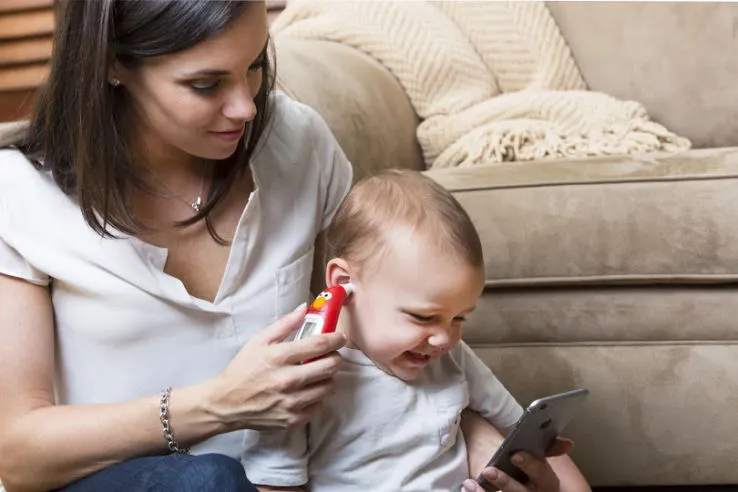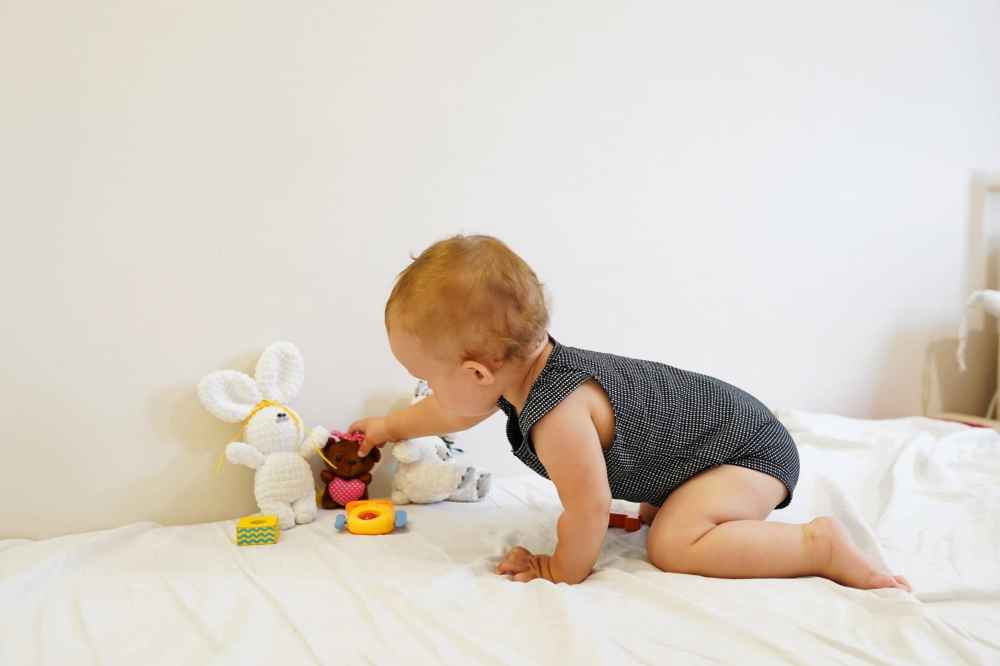Kinsa is the sponsor of this article. Use the promo code MOTHERLY15 to get 15% off Kinsa products.
In this Article
Vaccines
Teething
Infection
What can I do for my baby?
Motherly’s pediatricians offer the following advice when your child is suffering from fever:
The AAP has developed guidelines for fever in infants and toddlers aged 3-24 months.
It’s not pleasant to see your child with a fever. Here are some basic tips to help you identify the symptoms and know when to be concerned.
Is your baby feeling good right now? Happy dance! Save this image for later.
What you should know
What are some common causes of fever in babies?
- Vaccines
Keep cool and carry on: What mamas should know about baby fever.
The boo-boo can hurt in more than one way!
Pediatricians suggest that you monitor your child for signs of reaction after vaccination. A mild fever (anything over 100.4 rectally), occurs 12 to 48 hours following the vaccine. It is normal for children to have a slight fever, but if it exceeds 102* you should call your doctor.
- Teething
Keep cool and carry on: What mamas should know about baby fever 1
Teething Bites
The temperature may rise, but it is not high enough to qualify as a fever. A fever is generally defined as anything above 100.4 degrees Fahrenheit. Watch the temperature and provide frozen chew toys for your baby to enjoy.
NOMNOMNOM.
- Infection
Keep cool and carry on: What mamas should know about baby fever 2
Keep the bugs away from me.
The majority of fevers that infants experience are caused by her fighting off infections in her environment.
Your baby will likely encounter many bugs as her immune system develops during the first few years of life. During pregnancy and breastfeeding, she acquired many immunity to infections and diseases. She will continue to adapt once she receives her vaccines and develops her own immune system.
What can I do for my baby?
Keep cool and carry on: What mamas should know about baby fevers
Motherly’s pediatricians offer the following advice when your child is suffering from fever:
Dress in loose, light layers
Your baby can be bathed in water that is tepid.
Take the appropriate dosage of fever medication
You can call your doctor’s or nurse’s number to inform them of any changes (see below).
This Kinsa thermometer is a great way to monitor your baby’s temperature. Use promo code MOTHERLY15 to get 15% off any Kinsa products.
When should I call my doctor or worry?
Keep cool and carry on: What mamas should know about baby fevers 5.
Call your doctor immediately if your infant has a temperature of 100.4, or 38 degrees Celsius, or more. This is a medical crisis.
If your infant is between 7 weeks and 3 months old, but has a temperature above 101, you should make an appointment to see your doctor as soon as possible.
In the early months of your baby’s life, her immune system is still developing. She will need more care during fevers than in later months.
Dr. Sears says that there’s less to worry about for infants older than three months.
The AAP has developed guidelines for fever in infants and toddlers aged 3-24 months.
100.4-101 degrees: Don’t panic –slight fevers are common among infants–vaccinations and even mild viral illnesses can be to blame! Ask your doctor about the right dosage for a fever-reducing medication. Use your thermometer an hour after taking the medication to confirm that it is working.
If it’s 102-103°F, dress your baby in something light and cool. Call your pediatrician. Their advice could save you from an unnecessary visit to the doctor. You will probably be given a fever-reducing medication (like Tylenol or Motrin) and asked to take the baby’s temperature again in an hour.
If your child’s fever is 104 degrees and above, but drops quickly to 100 or 101 with treatment, it can be alarming but not a medical emergency. You can wait until morning to call your doctor if your child feels comfortable and the fever drops.
If your child has a fever of 104 degrees or more, and it doesn’t go down after treatment, you should seek immediate medical care. Contact your doctor as soon as possible to determine if you need to see your child immediately. They can also help your child feel better.
Some children with fevers over 104 are playful and happy. This can be reassuring, as it means they do not have any serious infections. A fever of 101 is concerning if the child seems lethargic or does not respond to you. “It’s more important to look at your child and see how they act than what the thermometer says,” says Dr. Tiffany Otto Knipe MD, FAAP, founder of Washington Market Pediatrics.
Remember: You are the best person to know your child. You should consult your pediatrician if she shows signs of lethargy or irritability.
Mama, you’re a strong woman. You’re doing great, baby!






